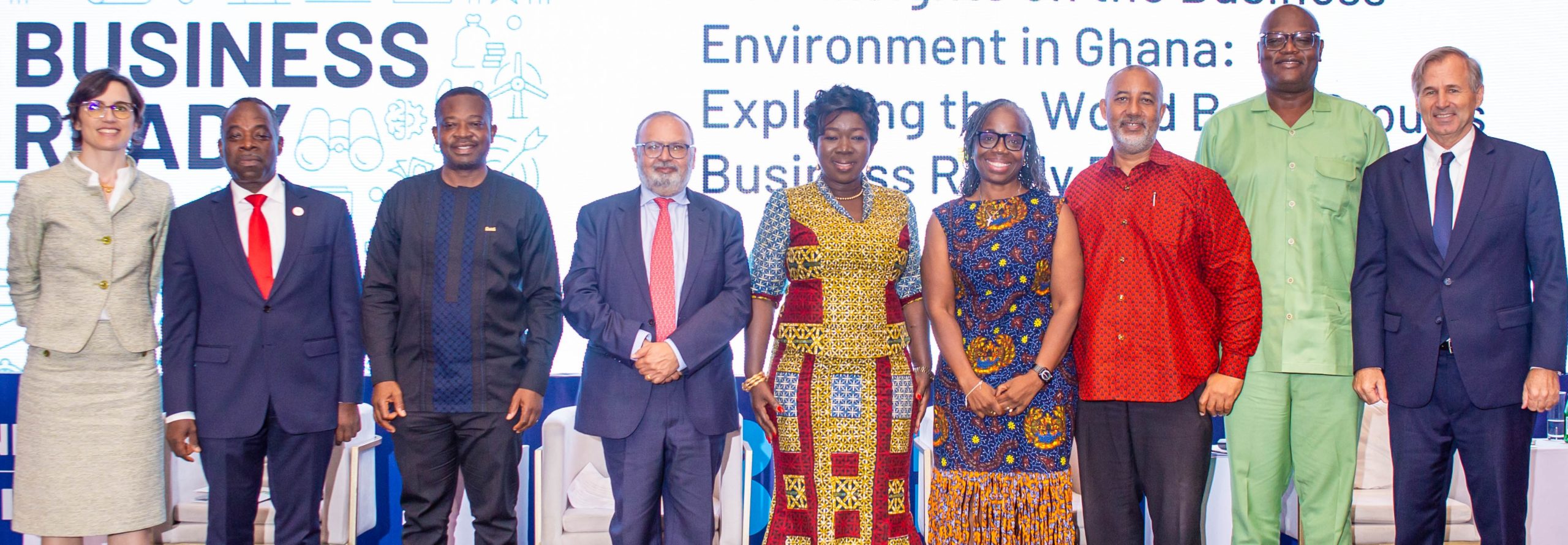
Accra, Ghana//- The latest World Bank Group’s Business Ready (B-READY) 2024 Report revealed that Ghana scored highest in Labour, Utility Services, and Business Insolvency than its peers in the Sub-Saharan Africa region.
According to the report, whose findings were discussed at a well-attended Ghana’s B-Ready Report Dissemination event in Accra today, Ghana scored 68.6 out of 100 in the Labour Market Regulations—outpacing many of its Sub-Saharan Africa peers in labour rights clarity, dispute resolution, and fairness.
It is only Rwanda which beat Ghana in that area as the East African country scored 69 which is only marginally higher than Ghana’s score.
For Utility Services: Ghana’s score of 68.5 ranks well above Côte d’Ivoire (58.9), Rwanda’s (67.8), and Togo’s (64.0), and is closing the gap with Tanzania (78.8).
Transparent tariffs and strong safety oversight contribute to investor confidence, the report stated.
Business Insolvency Framework: Ghana scored 64.9, providing clear pathways for firms facing financial distress—crucial for predictability and responsible risk-taking.
In a presentation, the Manager of the B-READY Unit at the World Bank Headquarters in the United States (U.S), Madam Valeria Perotti said within these areas, Ghana’s economy implemented good practices in its labour dispute resolution mechanisms, provides transparent information (connection requirements, tariffs, complaint mechanisms) for water and electricity, and electronic case management systems for liquidation and reorganization proceedings.
However, she noted that Ghana scored lowest in Market Competition, Business Entry, and Dispute Resolution.
Within these areas, the economy lags in the digitalization of intellectual property services, does not provide general and sex-disaggregated firm statistics, and also lags in the digitization of the judicial system, Madam Perotti said.
The Division Director (DD) for Ghana, Liberia, and Sierra Leone of the World Bank, Mr. Robert Taliercio O’Brien, explained: “The B-READY data highlights several areas where Ghana is doing better than peers in the Sub-Saharan Africa region”.
He therefore urged the government, business community, development partners, and other stakeholders to celebrate and continue to build upon it.
“The overarching conclusion is that, in many areas, Ghana has the regulatory framework and public services and infrastructure to deliver a competitive business environment, but operational efficiency has lagged because of limited implementation, particularly around digitalization and inter-agency coordination”.
These numbers represent more than statistics—they represent lost opportunities, constrained growth, and untapped potential, Mr O’Brien said.
On his part, Senior Country Manager for Ghana, Liberia, and Sierra Leone of IFC, Kyle Kelhofer added that they had examined research and data that identify both strengths and challenges in the business landscape.
“While factors such as labour quality and location competitiveness are strong, procedural inefficiencies remain a significant barrier. If we streamline regulatory processes and enhance operational efficiency, we can leverage these comparative advantages to drive economic transformation”, he stated.
There has also been considerable discussion around taxation and investment incentives. It’s not just about tax rates; it’s about how efficiently tax policies and business regulations are implemented. Coordination and clarity in these processes are essential for a thriving business environment, Mr Kelhofer urged.
In a keynote address, Ghana’s Minister for Trade, Agribusiness and Industry, Mrs Elizabeth Ofosu-Adjare applauded the World Bank saying: “The B-Ready initiative, launched by the World Bank as the successor to the Ease of Doing Business project, is not just a set of metrics, it is a roadmap for creating a business environment that is inclusive, sustainable and digitally driven”.
She continued: “The B-Ready offers us a unique opportunity to address the challenges that hinder our business environment while building on our strengths. It is not just about improving rankings, it is about creating an ecosystem where businesses can thrive, where innovation is encouraged and where every business in Ghana has the opportunity to succeed”.
In a panel discussion on the report, the panellists: Simon Madjie, CEO of Ghana Investment Promotion Centre (GIPC); Alexander Mould, CEO of Millennium Development Authority (MiDA); Ms. Mavis Owusu Gyamfi, President & CEO of African Center for Economic Transformation (ACET); Seth Twum Akwaboah, CEO, Association of Ghana Industries (AGI); and Ashok Mohinani, Executive Director of Mohinani Group) unanimously agreed that the Ghanaian government needed to do more to widen the country’s tax network.
The report link: file:///Users/masahudu/Downloads/Business%20Ready%20Ghana%20Profile.pdf


